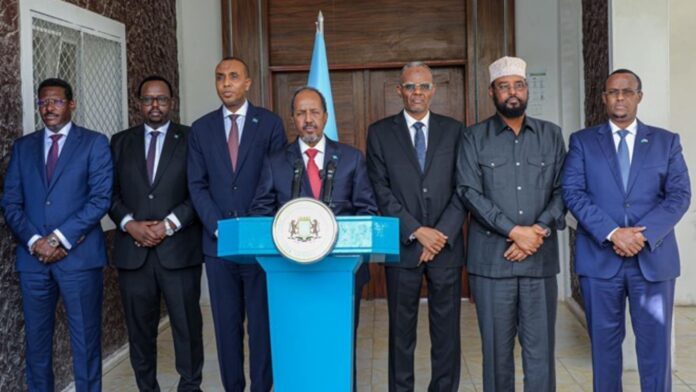The Federal Member States (FMS) of Somalia are currently engulfed in political turmoil due to delays in the election process. The Federal Government of Somalia (FGS) and the FMS agreed to adopt direct elections, moving away from the indirect election process that has been ongoing since 2001. However, the FMS have inherited political chaos since their inception. These states share similar crises rooted in the structure of their formation, where the FGS dominated their creation, election processes, and handed over power to their loyal candidates, except in Jubaland. The FGS rushed the creation of the FMS in the absence of a legal framework, and talks are still ongoing about the finalisation of the federalism status.
The FGS has not acknowledged the mistakes made in creating the FMS and is enthusiastic about rushing toward direct elections without proper groundwork. The constitution is still under review, with only four chapters approved, and essential laws, such as the election law and the political party law, remain in the pipeline. Security tensions, including clan fighting and the ongoing Al-Shabaab threat, persist. Additionally, Puntland’s grievances remain unaddressed, further complicating the situation.
FGS & FMS HEADING ON AN ERRONEOUS PATH
The creation of the FMS led to an erroneous path, involving political crises in the five states of Somalia: Jubaland (JL), Galmudug (GL), South West State (SWS), Hirshabelle (HRSH), and Puntland (PL). Four of the states have accepted direct election through the NCC agreement.
Puntland rejected participation in the NCC meeting and its outcomes. It existed before the FGS, and its administration created a council of elders and a political elite. The goal was to address security and stability challenges. Puntland has its own provisional constitution and by-laws implemented by its parliament, which are not harmonised with the FGS provisional constitution and by-laws. Puntland is unwilling to match with the federal system and laws, leading to frequent arguments with Mogadishu.
Puntland stopped collaborating with President Mohamed Abdullahi Farmajo and is not currently working with Hassan Sheikh Mohamud. For the first time, Puntland conducted its local elections through universal suffrage, which was held peacefully, and its presidential election took place on January 8, 2024, with the president elected by the parliament.
Other FMS accepted direct elections through the NCC agreement. The second-term elections for these four states occurred during Farmajo’s government, with Mogadishu playing a central role in manipulating the election process. This influence resulted in fighting and casualties in SWS and Galmudug, contributing to the broader political predicament in the country.
In SWS, the second-term election took place in 2018. The FGS deployed the Somali National Army (SNA) to Baydhabo to control the election and hand over power to its candidate Abdiaziz Hassan Mohamed. Mukhtar Robow (Abu Mansur) a former Al Shabab spokesperson resisted Mogadishu’s plan that was to make him withdraw the presidential candidate and to stop his social influence. In response, the Farmajo government deployed the Haramcad (a paramilitary force trained by Turkey) to Baydhabo, with support from the Ethiopian National Defence Force (ENDF) in which they arrested Robow. The local population protested, but the Haramcad and ENDF suppressed the protests, leading to fatalities and arrests of civilians. The FGS eventually succeeded its selection on electing Laftagareen as the president.
In Jubaland, Ahmed Mohamed Islam (Madobe)’s next term was in 2019. He rejected Mogadishu’s election process, similar to how he conducted the 2013 election without Mogadishu’s involvement. Although Mogadishu and Kismayo later reached an agreement facilitated by the Ethiopia goverment in Addis Ababa, Farmajo attempted to deploy the SNA in Kismayo. Madobe refused their landing, and Mogadishu planned to forcibly deploy the SNA in Kismayo with the assistance of the ENDF. However, Madobe, supported by the Kenya Defence Forces (KDF), who were responsible for Kismayo, prevented this deployment. The conflict led African Union Mission In Somalia(AMISOM) to engage with the international community, clarifying that Section Three was under KDF control, delaying the Ethiopia army’s deployment. Mogadishu’s ambitions could potentially cause conflict between Kenya and Ethiopia. Farmajo’s government deployed the SNA in Gedo, resulting in the disintegration of Jubaland’s administration, with Gedo still remaining separate from Jubaland. This conflict remains unresolved.
In Galmudug, the second-term election occurred in 2020. The FGS used similar tactics as in Jubaland and SWS, deploying their army in Galmudug to support their candidate, Ahmed Abdi Kariye (Qor Qor). The Ahlu Sunna Wal Jamaa (ASWJ) opposed the FGS’s manipulation of the election process. The ASWJ, which had previously liberated the region from Al-Shabaab, rejected the formation of Galmudug in 2015. However, IGAD’s efforts led to an agreement between ASWJ and the Galmudug state, with Ahmed Duale Geelle (Xaf) leading. ASWJ’s opposition resulted in them holding a separate election, where they elected Mohamed Ali Hassan (Sheikh Shakir) as their president. This double election led to increased conflict between ASWJ and the FGS in Dhusamareb, where ASWJ was defeated in battle, allowing Qor Qor to assume regular leadership of Galmudug.
Hirshabelle’s second-term election took place in 2020. The capital city of Hirshabelle is Jowhar, located 90 km from Mogadishu. The establishment process caused clan disputes. Mogadishu has significant influence in Hirshabelle (both Hiran and Middle Shabelle), and its army protects both Jowhar and Baladweyne. Mogadishu organized a reconciliation conference in Jowhar to address community disputes in the two regions. The conference resulted in a draft constitution and the selection of MPs by the elders. Hiran’s political elite and MPs advocated for power-sharing, where one region would hold the capital city and the other would hold the presidency. This was a gentleman’s agreement, not formalised in the constitution.
In the first term, Hiran received the presidential seat while Middle Shabelle received the capital city (Jowhar). However, in the second term, this mutual understanding was not honored, and Jowhar received the presidential seat with farmajo’s government support to its candidate Ali Abdullahi Hussein( Ali Guudlawe) from Jowhar . This led to Hiran’s refusal to cooperate with Jowhar and the declaration of Hiran as a separate state. This conflict remains unresolved.
THE LONG WAY TO THE DIRECT ELECTION
Since the Transitional National Government (TNG) was established in 2001 at the Arta Conference, Somalia has relied on indirect elections. Initially, elders selected the MPs without consulting elite clans, dominating the election. In 2016, the indirect election process developed slightly. The FGS set up regulations and processes where 51 delegates from clans selected by the elders voted for MPs on behalf of their respective sub-clans. By 2021, this number increased to 101 delegates.
This election system has faced criticism for its lack of transparency and security vulnerability, with elders, the FGS, and FMS scheming the selection and dominating election processes. The international community, including Somalia’s allies, has pressured the FGS to adopt one-person-one-vote electoral system. However, President Hassan Sheikh Mohamud (HSM) promised to implement direct elections and initiated early talks on the matter.
The NCC reached an agreement on the election process, requiring the finalisation of the constitution, securing the election process, minimising the threat of Al-Shabaab, and including the election law, political parties law, and comprehensive voter registration. Additionally, the demarcation of regional borders and a budget to support the election process are necessary. Meeting all these requirements on schedule for the FMS and FGS elections is challenging.
While FMS leaders and the FGS have agreed in principle to move towards direct elections and harmonise FMS elections, the NCC agreed to hold local elections in July 2024, with FMS MPs’ elections in November and the election of FMS presidents in December. However, significant practical challenges remain. Already, the local elections have not taken place, and it does not seem likely they can be implemented next year if the one-person-one-vote system is still respected.
The 4.5 clan formula, which allocates parliamentary seats based on clan representation, continues to play a crucial role in the indirect electoral process. This system, combined with a 275-seat parliament, indicates that the 4.5 formula may not align with the democratic system and may harm citizens’ rights to vote and hold elected positions. This formula often leads to election manipulation and term extensions by political leaders.
Currently, there is no clear indication that credible elections will take place on schedule. The ongoing election delays have further destabilised the FMS and intensified clan clashes and political crises. All four FMS (SWS, GL, JL, HSHS) presidential terms have ended, yet there is no election process currently underway. Although the NCC strictly believes in harmonising elections, the timeline remains uncertain.
However, Somali Federal Elite politicians always criticise the FGS election timeline while ignoring to pressure on the FMS to conduct their elections on time to avoid confrontation. They heavily protest Mogadishu to perform their election processes promptly. Some intellectuals criticise them for not being ready to talk about the delay, influence and the election corruption in the FMS goverments. As reported, during the last two indirect elections, some MP seats were openly sold, with prices in some cities reaching over 1 million dollars.
Since politicians know that the FMS leaders hold significant power, they see an opportunity to benefit. They fear that if they criticize the election delays by the FMS leaders, they will lose their influence and MP seats. These politicians do not prioritize the long path toward direct elections, which they view as a distant target that cannot be achieved before the next election.
Author: A.Bari Zaki
Contact info: abdibari311@gmail.com
Twitter X: @BariZaki65
The views expressed in this article belong to the author and do not necessarily reflect the editorial policy of Horn Broadcasting Network.


